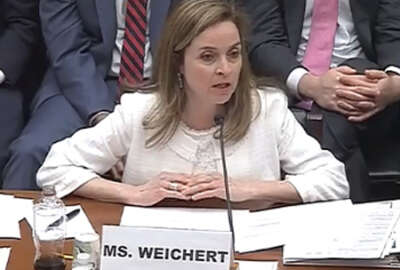Democrats on the Senate Homeland Security and Governmental Affairs Committee said Wednesday the Trump administration is “stonewalling” them on further details and data related to the White House’s reorganization proposals.
At a hearing on the government reorganization, senators said they haven’t received any of the nearly 106,000 comments the White House solicited from members of the public, and they weren’t given any cost-benefit analyses, data or evidence to justify these recommendations.
“If there are some bold moves made within the executive branch without legislative buy-in, you’re not going to get efficiencies,” committee Ranking Member Claire McCaskill (D-Mo.) said. “You’re going to get a food fight.”
Democrats looking for more answers from the administration on its government reorganization proposals came away wanting more after Wednesday’s hearing with the Office of Management and Budget.
The administration will need congressional approval to implement many of the ideas it announced last month. But without more detail, several Senate Democrats said they’re having a difficult time jumping on board with these reorganization proposals — even if they might like many of them.
Best listening experience is on Chrome, Firefox or Safari. Subscribe to Federal Drive’s daily audio interviews on Apple Podcasts or PodcastOne.
The administration has identified 10-to-12 proposals from its reorganization plan that it can accomplish without Congress, Margaret Weichert, OMB deputy director for management, told the committee.
Proposals to improve customer experience, bolster the federal cybersecurity workforce and transfer the governmentwide security clearance portfolio are among the ones that Weichert mentioned the administration could implement sooner rather than later. She said OMB is taking the rest of the summer to work through the details of those proposals before announcing specific action.
There are roughly 30 other ideas that will need congressional action to implement, though Weichert said she wasn’t able to specify further. She said she didn’t want to interrupt the typical, predecisional planning that OMB was engaged in with various agencies on these reorganization ideas.
“We are trying to be open and transparent at the appropriate time,” Weichert said.
The House Oversight and Government Reform Committee had its turn late last month to learn more about OMB’s plans. The tone was relatively calm even as members expressed their concerns with proposals at the Postal Service and Office of Personnel Management.
OMB’s recommendations for OPM didn’t get much attention from the Senate, though Sen. James Lankford (R-Okla.) said he would hold hearings “soon” to explore the agency’s functions and challenges.
But Senate Democrats on Wednesday showed deep frustration with Weichert’s answers, and they flatly disagreed with committee Chairman Ron Johnson (R-Wis.) about how well the administration was managing and communicating with the public, the federal workforce and Congress about such a large government reorganization.
“You can’t expect us to sit here at a hearing and say, ‘Gosh, this is a great document,'” McCaskill said. “You have to expect us to ask where it came from. You have to expect us to ask basic questions about what underlies these recommendations. Where did they come from? What are they based upon? Did you expect this hearing to be, ‘Gosh, this is really great. Thanks?'”
“We have a right to know where these proposals came from,” she continued. “Did the USDA recommend this? Was there a recommendation from Postal? Was there a recommendation from the Department of Defense as it relates to the Army Corps of Engineers? These are all reasonable questions to be asked.”
“At the appropriate time,” Johnson said.
“But then what is this hearing for?” McCaskill asked.
“This is the first step in the consultative process,” said Johnson, who praised Weichert for briefing members on the White House plans and said he didn’t see any other way OMB could have handled reorganization roll-out.
But for McCaskill and regulatory affairs and federal management subcommittee Ranking Member Heidi Heitkamp (D-N.D.), they want to know where these reorganization ideas came from. They were both particularly concerned about the origin behind the White House proposal to privatize the U.S. Postal Service and questioned whether the president’s newly-formed task force had made such a suggestion.
Weichert didn’t offer many details but simply pointed out that the president had announced the creation of the postal task force after he had signed an executive order in March 2017, which urged agencies to develop reorganization proposals.
Members also asked about the origin behind a few of the other ideas, including major moves at the departments of Agriculture, Education and Labor.
In particular, Heitkamp wanted to know the origin of the proposal to move the Supplemental Nutrition Assistance Program (SNAP) from USDA to the Health and Human Services Department.
“Imagine that you are on this side of the dais and you are responsible for implementing this,” Heitkamp said after she didn’t receive an answer. “We want to help you. But this is the answer we get: ‘We release this document. It makes us look like we’re innovators [and] reformers. But oh by the way, don’t ask the question about whether USDA had this recommendation or HHS, or if that was just something that someone invented over at OMB?'”
As both members of Congress and the executive branch have reiterated, the Trump administration isn’t the first to suggest reorganizing several agencies. But McCaskill said past efforts have failed, in part, because prior administrations didn’t partner with members of both parties in congressional oversight committees.
“If you will begin to share and not stonewall, you might be pleasantly surprised how cooperative many of us are,” McCaskill said. “You’re not going to get 85 votes. But I damn well bet you could get to 60. … This will be marked as an ‘F’ and will go into dustbin of history if you do not get the trust and cooperation of Democrats that want the same goals that you want.”
Copyright
© 2024 Federal News Network. All rights reserved. This website is not intended for users located within the European Economic Area.
